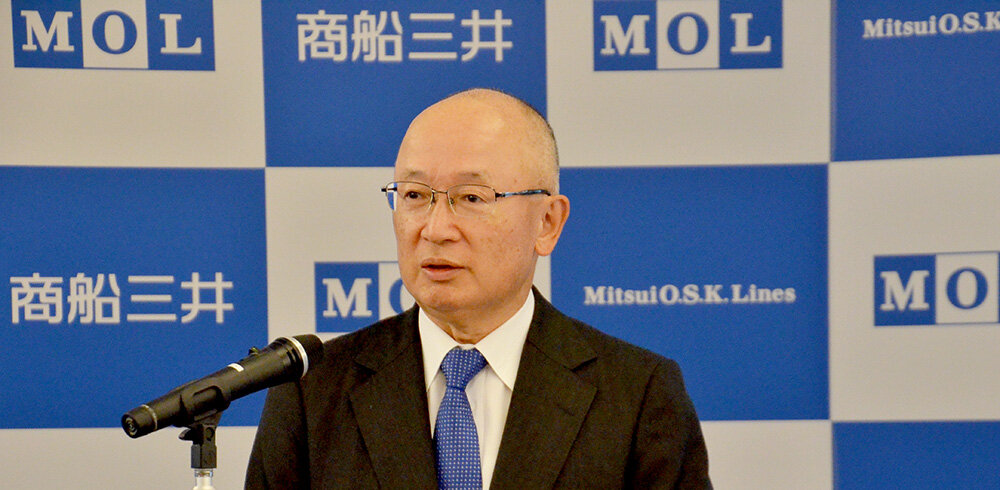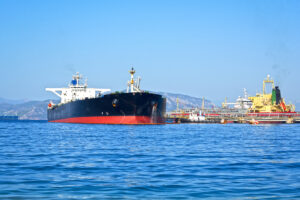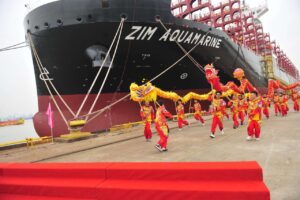
Japan’s shipping major Mitsui O.S.K. Lines (MOL) president and CEO Takeshi Hashimoto delivered the following 2025 New Year message to all MOL Group officers and employees on January 7.
“Reflecting on our group’s performance in 2024, we have benefited from favorable market conditions in the chemical tanker, car carrier, and containership businesses. This was partly due to many merchant vessels detoured from the Red Sea and Suez Canal to around Cape of Good Hope amid rising geopolitical risks. In addition, the continued depreciation of Japanese yen has led our performance to exceed initial expectations.
On the other hand, potential risks remain, such as the relationship between the incoming U.S. administration and China, and the prolonged war between Russia and Ukraine.
Therefore, we aim to generate profits and build up our strength in favorable segments while also strengthening our intelligence, decision-making mechanisms, and human capital capabilities to prepare for the uncertain business environment ahead.
Although challenging conditions may threaten the continuity of some companies in the industry, I am confident that overcoming these challenging conditions will make the MOL Group even stronger.
Phase 1, initial three years of the Management Plan ‘BLUE ACTION 2035’, which started in April 2023, reached its midpoint last October and is now in its latter half. It is very encouraging that we were able to build up our equity capital over 2.6 trillion yen on the back of our strong performance, and we have made good progress in investing for future growth.
We have been pressing ahead with new initiatives in the LNG carrier, wind power generation, chemical tanker, car carrier, and real property businesses. I would like to see all segments boldly pursue transformation, unbound by conventional thinking, to adapt to changes in the business environment.
Outlook for 2025
The year 2025 is the final year of Phase 1 of “BLUE ACTION 2035”, and will be crucial for designing the details of Phase 2, which will begin in FY2026.
Our group’s assets have already exceeded 4 trillion yen, and from this point on, we will no longer be in a stage of rapid expansion.
To maintain growth in this environment, we need to make our strong segments stronger and increase the number of segments and domains in which we can gain a competitive advantage in the world. We want to gain the top position in particular fields and specific region, even if we cannot claim leadership in the entire business. We will identify winning strategies and invest our human capital and financial resources in these areas, rather than pressing on aimlessly with current businesses.
Also, considering the need to increase shareholder returns, our equity capital will only increase by 100 to 150 billion yen even if we earn profits of 200 to 300 billion yen annually. It is vital that we will sell or replace assets to efficiently accumulate profits. We will need to use more diverse tactics beyond mere business expansion.
Strengthening our human capital portfolio is also major challenge for further growth. Traditionally, we have been good at safely and efficiently managing businesses once they entered the operational phase.
Although we have an abundance of skilled personnel in these areas, we need to increase the number of people who can start new businesses or transform current businesses, in other words, people with a hunter’s mindset. Observing oil majors in Europe and the U.S., they are remarkably successful in allocating human resources, accurately assessing which stage they are at in a particular business domain, new business development, project execution, or commercial operation, and then assigning appropriate personnel accordingly.
We plan to reform our personnel system in FY2025, but I do not expect it to function perfectly from the start, so I hope to bring the system closer to its ideal form over the next two to three years, while continuing to make necessary adjustments after its implementation.
Currently, overseas offices and group companies basically operate with the aim of individual optimization, which may not fully utilize their capabilities for both the individual employees and the company in some respects.
In the future, we will aim to achieve total optimization through flexible operation of the personnel system, which will allow not only the transfer of executives from the Head Office to group companies, but also lateral transfers from group companies to the Head Office and among group companies.
Through these reforms, I also aim to strengthen the corporate divisions of MOL. Until now, the divisions have been expected to mainly support the business divisions, but from now on, I envision them becoming like command centers that drive the growth of the business divisions and each region.
Turning to global environmental issues, which are also a major management challenge for our group, the enthusiasm we saw around the time of the 2021 Glasgow Accord has faded, and it is becoming harder to envision a scenario in which hydrogen, biofuels, and other green fuels rapidly spread and replace fossil fuels. On the other hand, since the climate change issue itself remains unresolved, our group must make continuous efforts to improve operational efficiency to reduce GHG emission that, even though their impact is small, are proven and feasible in combination with the use of alternative fuels.
While we pride ourselves as a member of First Movers Coalition, we must avoid getting too far ahead of others. We need to become “movers and shakers” and create trends along with other like-minded partners. Through such efforts, I hope to meet the needs of our major customers, including the steel industry, electric power industry, automobile industry, resource majors, oil majors, and others.
As a result of economic globalization and remarkable advances in communication technologies, many industrial sectors, not only our own, are in the midst of significant transformations. Company expects greater output from individual employees.
Some may miss the way they worked in the past. However, as a company, we must aim to continue growing, increase business scale, profit levels and stock prices, and improve dividends to shareholders and remuneration to executives and employees. To achieve all that, we must implement more precise and effective management plan.
In the Year of the Osaka Expo
The World Expo will be held in Osaka from April to October this year. We will exhibit the Wind Hunter, a next-generation zero-emission ship that captures wind to produces and transports hydrogen, in the “Transportation and Mobility” zone at the “Future Life Expo: Future City” pavilion. This opportunity is particularly meaningful for our group, which also has roots in Osaka. I hope to enhance our presence through the Expo and leverage the vibrant energy of Osaka, buoyed by inbound tourism as a tailwind for the further development of our group.
In closing, I extend my New Year’s greetings with wishes for the safety of all MOL Group-operated vessels and sites and people working there, and for the health and happiness of all MOL Group members and their families worldwide.”


